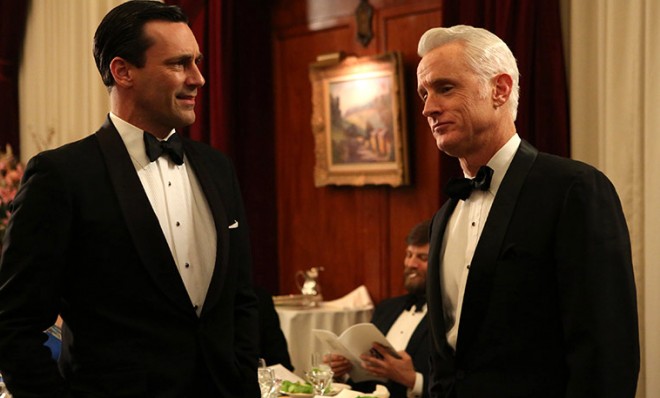Mad Men recap: 'The Flood'
Last night's episode saw Mad Men take on yet another American tragedy: The assassination of Martin Luther King Jr.


A free daily email with the biggest news stories of the day – and the best features from TheWeek.com
You are now subscribed
Your newsletter sign-up was successful
Last night's "The Flood" saw Mad Men employ the same "what does it all mean?" approach to an American tragedy that it previously used in season two's "Crisis Management" (the Cuban missile crisis) and season three's "The Grown Ups" (the assassination of John F. Kennedy). This time, it was the assassination of Martin Luther King Jr. — which, in characteristic Mad Men fashion, the show's characters use as an excuse to think and talk about themselves.
I wouldn't go as far as calling "The Flood" a Very Special Episode of Mad Men, but it does represent a jarring diversion from the rough arc that the series has been following so far this season. There's no sex in "The Flood," and aside from Harry Crane's whining and Megan's barely acknowledged award, there's very little discussion of business — just a bunch of people who are shell-shocked by a tragedy. Pete Campbell is personally devastated. Ginsberg interrupts his Woody Allen routine of a date and rushes home. Henry Francis sees it as a political opportunity. Joan awkwardly hugs Dawn. Sally, a budding activist, accompanies Megan to a vigil. And Don Draper, miserable alcoholic that he is, drinks glass after glass of whiskey.
All these disparate elements come together to ask one of Mad Men's favorite questions: How should a person react after a great tragedy? This is very well-trod territory for Mad Men, but it's also a situation that the series handles both compellingly and honestly; though "The Flood" skirts many of the broader racial implications of the assassination, that's only because its white, WASPy protagonists are so far removed from those issues that it would have felt inauthentic for the show to address them more directly. (Still, this perceived failure to properly engage with big racial issues has some critics panning the episode as the series' worst ever.)
The Week
Escape your echo chamber. Get the facts behind the news, plus analysis from multiple perspectives.

Sign up for The Week's Free Newsletters
From our morning news briefing to a weekly Good News Newsletter, get the best of The Week delivered directly to your inbox.
From our morning news briefing to a weekly Good News Newsletter, get the best of The Week delivered directly to your inbox.
We end up spending much of our time in the days following Martin Luther King Jr.'s death with an unlikely figure: Bobby Draper, who shares his father's "bread and circuses" approach by taking in two consecutive screenings of Planet of the Apes. The parallel being drawn isn't exactly subtle — did we really need the shot of Charlton Heston's character screaming, "You maniacs. You blew it up. Damn you. Damn you all to hell"? — but it serves as a reminder of just how impossible it is to escape a tragedy. Everything is suddenly charged, fraught with unintended parallels and double meanings.
But for all the characters we spend time with in "The Flood," only one person speaks with the wisdom of experience: Ginsberg's father, a Holocaust survivor who berates his son for abandoning his date after news of the assassination begins to spread. "Now's the time when a man and a woman need to be together the most. In a catastrophe," he insists, in a speech that gives the episode its name. "In a flood, the animals went two by two."
Of course, there's not a whole lot of two by two on Mad Men these days. Really, which of Mad Men's many romantic couplings can be described as "together" right now? The gulf between Don and Megan seems to be growing, as they spend the days following the assassination apart before Megan finally calls Don out on his drinking and absentee parenting. Peggy and Abe have an honest conversation about their apartment, which seems to bring them closer together — but the loaded, amorous glances that Peggy keeps getting from her boss Ted Chaough are a sign that trouble may be on the horizon. Trudy and Pete are talking, but she holds firm, refusing to let him return home. The only romantic relationship we have on Mad Men that seems entirely functional is between Betty and Henry — though knowing how this series works, it'll be a miracle if their relationship makes it through Mad Men unscathed.
Read more Mad Men recaps:
A free daily email with the biggest news stories of the day – and the best features from TheWeek.com
* Mad Men recap: To have and to hold
* Mad Men recap: Sex, lies, and a ketchup account
Scott Meslow is the entertainment editor for TheWeek.com. He has written about film and television at publications including The Atlantic, POLITICO Magazine, and Vulture.
-
 How the FCC’s ‘equal time’ rule works
How the FCC’s ‘equal time’ rule worksIn the Spotlight The law is at the heart of the Colbert-CBS conflict
-
 What is the endgame in the DHS shutdown?
What is the endgame in the DHS shutdown?Today’s Big Question Democrats want to rein in ICE’s immigration crackdown
-
 ‘Poor time management isn’t just an inconvenience’
‘Poor time management isn’t just an inconvenience’Instant Opinion Opinion, comment and editorials of the day
